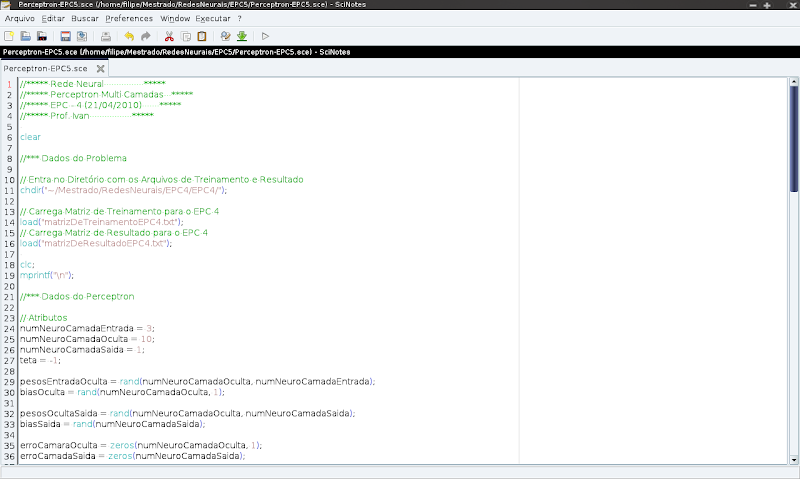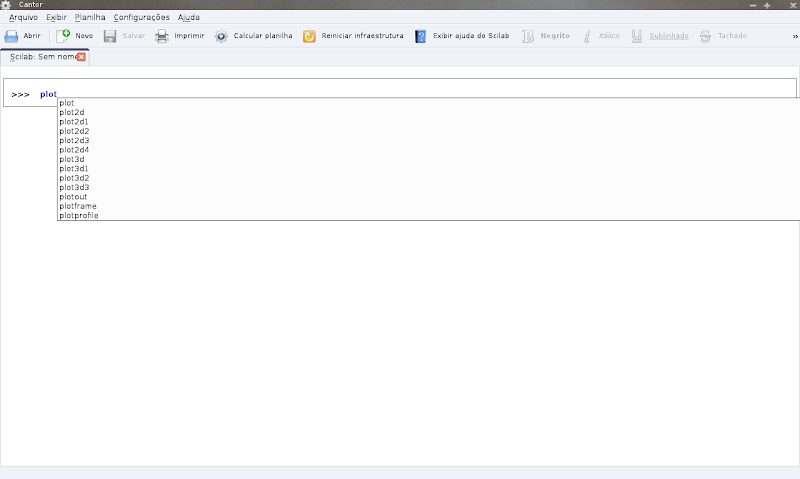O PSL-PI tem por objetivo incentivar o uso e a produção de software livre no Piauí como política de combate à exclusão digital. Acreditamos que a distribuição de conhecimentos proporcionada pelo Open Source/Software Livre tornará nossa sociedade mais justa e próspera, exatamente por dar a todos as mesmas condições de conhecimento e desenvolvimento.
Software Livre é uma grande oportunidade de construirmos uma sociedade produtora de ciência, independente e efetivamente competitiva. Estamos reconstruindo as bases da nossa sociedade, não mais calcados nos braços do Estado, mas sim, amparados pela iniciativa própria, pela auto-determinação. Nós somos capazes de nos auto-governar. Somos capazes de construir uma sociedade efetivamente Livre. Esta é a essência do PSL-PI.
O PSL-PI é formado pela articulação de indivíduos que atuam em instituições publicas e privadas, grupos de usuários e desenvolvedores de software livre, empresas, governos ou ONGs, e demais setores da sociedade. O importante é a consciência e disposição para propagar o uso de software livre e a cultura colaborativa nas diferentes esferas da sociedade.
Lucas M.A.C.: Micro$oft ajudando o Linux??? oO
18 de Julho de 2011, 0:00 - sem comentários aindaLucas M.A.C.: Micro$oft ajudando o Linux??? oO
18 de Julho de 2011, 0:00 - sem comentários aindaFilipe Saraiva: Scilab Backend to Cantor: Syntax Highlight and Tab Complete
18 de Julho de 2011, 0:00 - sem comentários aindaI bring in this post some news about the Scilab backend to Cantor, my Google Summer of Code project in this year.
After the last weeks of work, two interesting features were implemented in the Scilab backend: syntax highlighting and tab complete for predefined functions and variables. These features are cool because they are present in most IDEs, and they, together with other features, are what make us want to write lines of code in IDEs, no in conventional text editors. ![]()
These features were developed based on how they are implemented in Maxima backend: using XML file that lists all predefined functions and variables.
Some screenshots to demonstrate the operation of them. Below is the syntax highlighting in SciNotes, the Scilab default editor:
 Syntax highlight in SciNotes
Syntax highlight in SciNotes
To find all the keywords of predefined functions names and variables, I used getscilabkeywords, a function that lists all the Scilab keywords. With it in hand, I could create the XML file with these data. Below is the syntax highlighting in Cantor:
 Syntax highlight in Cantor
Syntax highlight in Cantor
There’s one detail to complete this feature: the highlight of predefined variables. But I’m talking with Alex Rieder to finish it.
Below, as a curiosity, the Scilab syntax highlighting in Cantor and SciNotes, side by side:
 Syntax Highlight in Cantor and SciNotes
Syntax Highlight in Cantor and SciNotes
The other feature is the tab complete, which makes the Cantor suggest names of predefined functions or variables for the developer writing the code. In Cantor, simply enter any character and press the TAB key (default for this feature in this software).
In the picture below we have the autocomplete function names suggested for the word “plot” (the function of generating graphics in Scilab):
 Tab complete in action!
Tab complete in action!
Unlike the syntax highlighting, the autocomplete is also working to predefined variables.
The code for this is Cantor repository, currently in scilab-backend branch. Feel free to test, but do not forget: you must compile Scilab also for try this backend!
Well, that’s it for now! The project is well advanced and, perhaps, we will support the Scilab in Cantor in KDE SC 4.8 version? ![]()
And who goes to Berlin we’ll see you there!

Filipe Saraiva: Backend do Cantor para Scilab: Destaque de Sintaxe e Autocomplete
18 de Julho de 2011, 0:00 - sem comentários aindaTrago neste post algumas novidades sobre o suporte ao Scilab no Cantor, meu projeto do Google Summer of Code deste ano.
Após as últimas semanas de trabalho, duas interessantes funcionalidades do backend foram implementadas: o destaque de sintaxe e o autocomplete para funções e variáveis pré-definidas. Estas funcionalidades são legais pois estão presentes na maioria das IDEs e elas, em conjunto com outras características, são o que nos fazem preferir a escrever linhas de código em IDEs do que em editores de texto convencionais. ![]()
Essas funcionalidades foram desenvolvidas baseadas na forma como estão implementadas para o backend de Maxima: usando arquivo XML que lista todas as funções e variáveis pré-definidas.
Alguns screenshots para demonstrar o funcionamento delas. Abaixo, temos o destaque de sintaxe do Scilab no SciNotes, o editor padrão do Scilab:
 Destaque de sintaxe no SciNotes
Destaque de sintaxe no SciNotes
Para encontrar todas as palavras-chave de funcionalidades e variáveis pré-definidas, usei a função getscilabkeywords que lista todas as palavras chaves do Scilab. Com ela em mãos, pude criar o arquivo XML com estes dados. Abaixo vemos o destaque de sintaxe no Cantor:
 Destaque de sintaxe no Cantor
Destaque de sintaxe no Cantor
Ainda falta um detalhe para completar esta funcionalidade: o destaque de variáveis pré-definidas. Mas estou conversando com o Alex Rieder para terminarmos isso.
Abaixo, como curiosidade, o destaque de sintaxe do Scilab no Cantor e no SciNotes, lado-a-lado:
 Destaque de sintaxe no Cantor e SciNotes
Destaque de sintaxe no Cantor e SciNotes
A outra funcionalidade é o autocomplete, que faz com que o Cantor sugira nomes de funções ou variáveis pré-definidas ao desenvolvedor durante a escrita do código. No Cantor, basta após qualquer caractere digitar a tecla TAB (padrão neste software para esta funcionalidade).
Na imagem abaixo temos o autocomplete sugerindo nomes de função para a palavra “plot” (a função de gerar gráficos no Scilab):
 Autocomplete em ação!
Autocomplete em ação!
Ao contrário do destaque de sintaxe, o autocomplete também está funcionando para as variáveis pré-definidas.
O código deste backend está no repositório do Cantor, atualmente no branch scilab-backend. Fique a vontade para testar, mas não se esqueça: você deve compilar também o Scilab caso queira experimentar o suporte no Cantor!
Bem, por enquanto é isso! O projeto está bem avançado e, quem sabe, teremos o suporte ao Scilab no Cantor versão KDE SC 4.8? ![]()
E para quem for à Berlim: nos veremos por lá!

Filipe Saraiva: Going to Berlin!
10 de Julho de 2011, 0:00 - sem comentários ainda
Between the 6th and August 12th, Berlin, capital of Germany, will host the 2nd Desktop Summit – the meeting united of the two largest communities of free desktop environments developers: Gnome and KDE!
These groups annually held international meetings focused on their respective communities: the GUADEC, of Gnome and Akademy, of KDE. In 2009 there was a unified against these communities, which was called Desktop Summit, in Gran Canaria. This event was interesting in the maturation of ideas and projects to be shared by the software developed by these communities, providing greater interoperability to the free desktop in general. Many of these projects are now hosted in the initiative FreeDesktop.org.
And this year, I will go to the Desktop Summit! Thanks to my contributions to KDE, the KDE e.V. gave me a help for the trip, where I will participate actively in the meeting.
My goals, among others, is to have greater contact with the staff of KDEedu, the educational software project of KDE which is where my main contribution with code. Another goal is also to have greater interaction with the team of international promotion of KDE in order to we can be more active in the dissemination of software projects and communities in Brazil. Another idea is also talking with the staff of Mageia, the distro that I use today and try to contribute.
But the main one is to make friends, know who develop my favorite software that I use in my day-to-day, to share a few beers with these guys and a deeper understanding of the community! This will certainly be reflected in my code in future contributions to KDE.
Then in August, wait for reports of this interesting experience!



